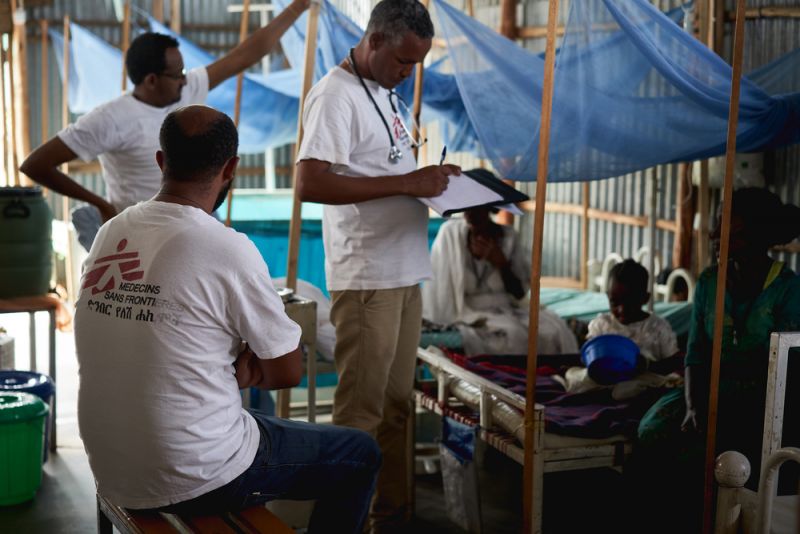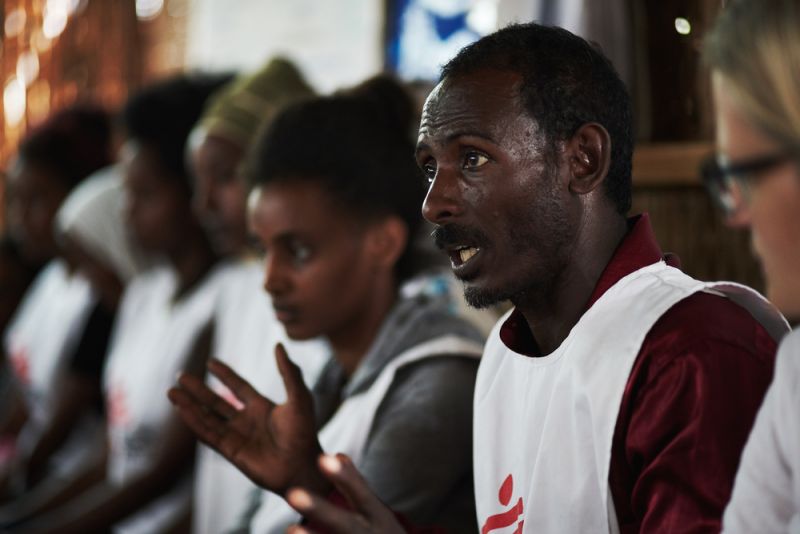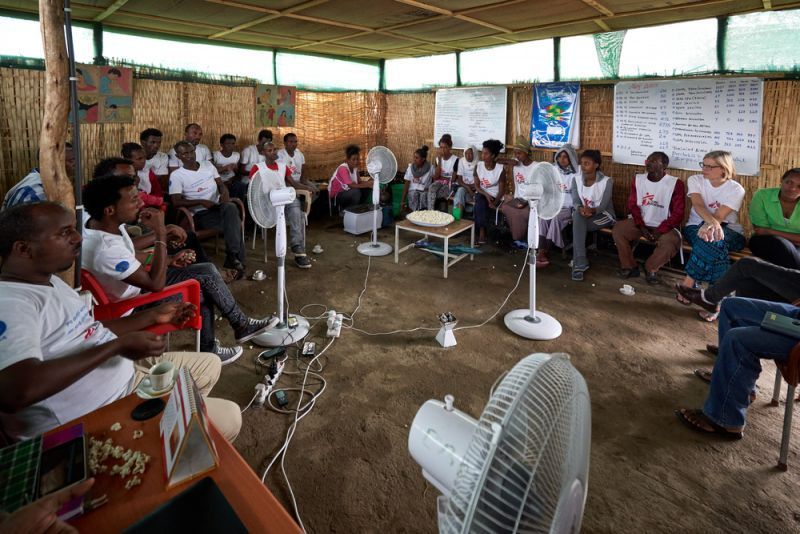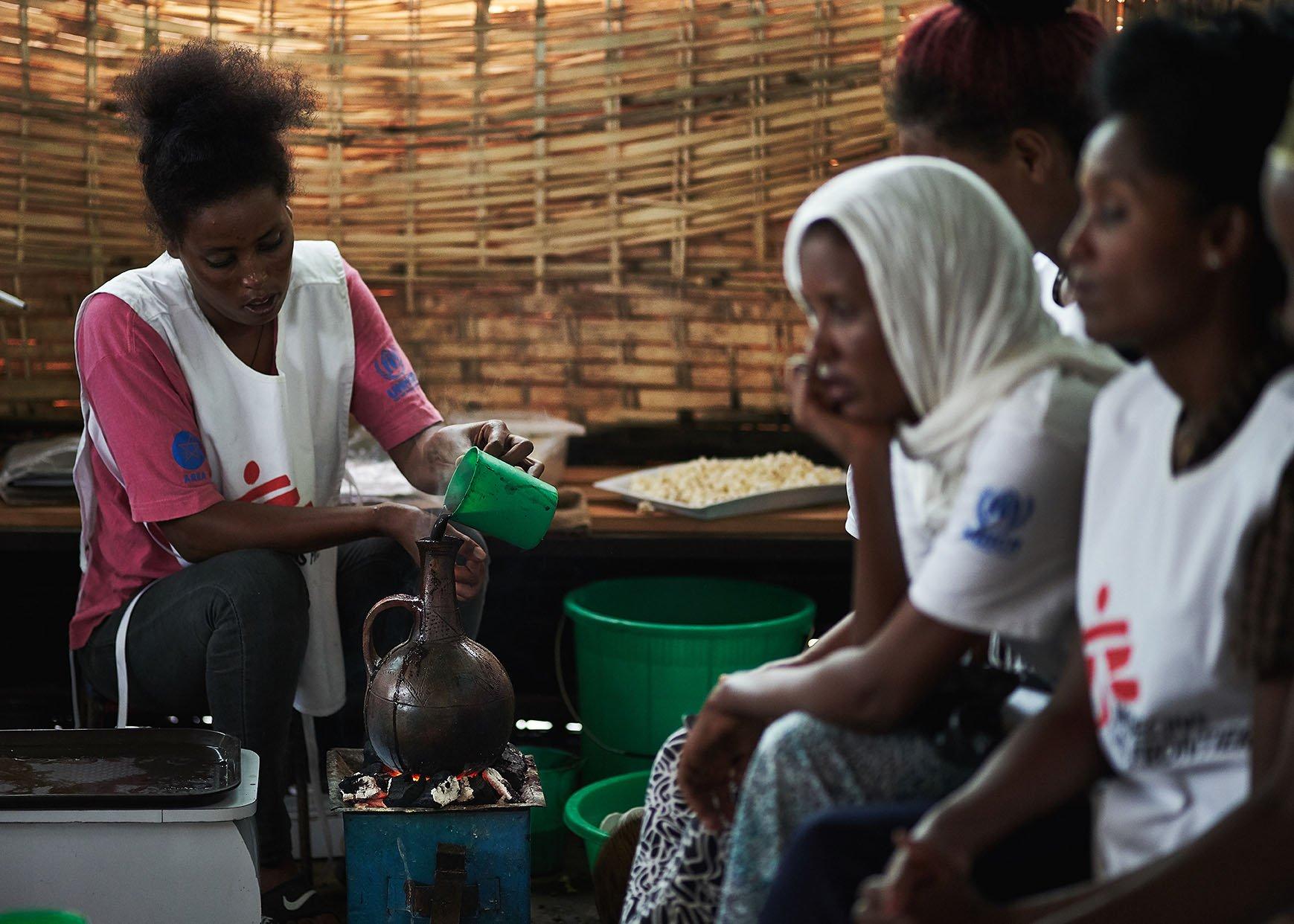Every month, around 5,000 Eritreans flee their country. Half of them arrive in refugee camps in the Tigray and Afar regions of Ethiopia. Since 2015, MSF has provided health services in the area, with a focus on mental health and psychiatric care, to the population of Hitsats and Shimelba refugee camps, as well as to the host community.
*Hellen, 30 years old Eritrean refugee and MSF lay councellor in Hitsats refugee camp shares her story.
I arrived in Ethiopia 11 months ago. I tried to leave the country the legal way but I was denied permission.
I had a pretty good life in Eritrea. I was lucky enough to have a short military service in comparison to many other people. I was asked to serve for only one year and eight months. Once discharged, I was given a documentation officer job in the Ministry of Justice. I worked there for almost two years. Then they decided to move me from one sector to the other.
They gave me a job as tourism officer, then as a cashier in a shop and finally as a waiter in a restaurant. The government can move you from job to job according to what they think the country needs at that moment.
Throughout this time, I was earning enough to provide for my son and myself. I was a single mother so I considered myself very lucky. But then, one day, I fell in love with a Muslim man. He really understood me and we loved each other. I soon became pregnant with my second child.
The problem was that our family members and communities did not accept seeing a Christian and a Muslim together as a couple. We were victim to a lot of stigma and prejudice. My family condemned my choice and my coworkers started harassing me. I felt very isolated, I fell into depression and I started performing badly at work. The fact that I was pregnant didn’t help and I became scared for the health of the child I was carrying.

This is when I decided to leave the country. At first, I tried to do so the legal way, asking for permission to go to Ethiopia. Since I had completed my military service I had a valid passport but I was not granted permission to leave because of my first child, who was nine years old at the time. In Eritrea, children older than five cannot leave the country until they go through military service.
The situation at home was getting worse and worse. I felt like I needed to run away, it didn’t matter if it was legally or illegally. I waited until my baby girl was born and then I moved as far as I could go in Eritrea. I sold all my gold and jewelry and paid smugglers to take us to Sudan. We did not have enough money for my partner to follow us. He stayed behind.
During the journey from Eritrea to Sudan, my baby girl got sick. Once we arrived in Sudan, the smugglers put us in a warehouse. I decided to go out and look for medical help, even if I was afraid that people would report us to the police and that we would be taken back to Eritrea.
I speak pretty good Arabic so I asked a man if he could give me directions to the nearest doctor. He seemed very kind and offered to show me where the clinic was. He took us to a building and told me that the doctor’s office was inside. It didn’t look like a clinic or a hospital but he convinced me to go inside. After we entered, he assaulted me and raped me very violently in front of my children. That was my first day in Sudan.

After three days there, the smugglers took us to Addis Ababa. The journey was difficult because I had injuries from the assault and couldn’t move very well. I became very depressed and developed severe back and leg pain. During the 4 months that I spent in Addis, my health deteriorated. I fainted a few times and the pain became worse.
The Eritrean people I was staying with took me to the hospital but I was not ready to talk to a stranger about what had happened. I took the decision to claim refugee status. I went to the ARRA office in Addis (Administration for Refugee & Returnee Affairs) and they sent me to the Edabuguna reception center, in the north of the country close to the Eritrean border. After registration, I was transferred to Hitsats refugee camp.
When I arrived there, I was in a bad state. I didn’t feel safe and I was constantly re-experiencing what had happened to me in Sudan. I became unable to properly take care of my children. Because of all this ARRA referred me to the MSF mental health program. It was the first time I heard of the organization but I went there anyway to see if I could get help.
The first session didn’t go very well. I was agitated and afraid that they would expose me to the public judgement and shame me in front of everyone because of what had happened to me. It was good that I was assigned a female psychiatric nurse and a female counsellor. I don’t think that I would have been able to talk to a man.
This allowed me to slowly develop trust. It still was a difficult process but I developed a very good relationship with the female counsellor. Things started improving, especially after I started taking medications for my depression, the sleeping problems and the pain.

It is seven months now since I’ve been going to sessions, once per week. My life has improved a lot thanks to these services, to the point where I can say that I feel pretty good now. As a mother, it is terrible to not be able to take care of your children.
Now I can be there for them and I feel so happy. Mental health support is very important for people that go through these kinds of experiences. MSF gave me my life back. I am very thankful for this second chance to live again.
After four months of counselling, I was already free of most of the symptoms I had. I told myself that I could help others and that my experience would help me relate to them. So I went to the mental health supervisor and asked if there was anything I could do to help.
That’s how I became a lay counsellor in the MSF mental health team. In the future, I hope I will be able to keep on helping other survivors of violence, independent of where in the world I will be.
The name has been changed to protect the identity of the interviewee. There are no images available of Hellen, as she requested anonymity.
Find out more about MSF's work in Ethiopia.
